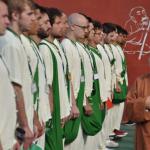Very few people are trained in both (Western) philosophy and Buddhist studies these days. Those trained in philosophy are typically taught that Philosophy is only a Western activity – and by Western they mean Euro-American (plus Canada and Australia, but definitely leaving out non-White sources). Those trained in Buddhist studies are typically taught as philologists, anthropologists, and/or scholars of religion. And, for various reasons, these folks tend also to see philosophy as just a Euro-American undertaking.
Over the years, a growing number of scholars trained in both area have worked to build bridges. However, it is an uphill battle! For every article, op-ed, and book that comes out showing commonalities, intersections of technique, and areas of mutual concern, one or two come out from one of the entrenched camps arguing the opposite. Matthew Kapstein, in his book in Indo-Tibetan philosophy, Reason’s Traces, illustrates the difficulty with a quote from the eminent Western philosopher Anthony Flew:
Philosophy… is concerned first, last and all the time with argument… [B]ecause most of what is labelled Eastern Philosophy is
not so concerned… this book draws no materials from any sources east of Suez. (from hist 1971 An Introduction to Western Philosophy)
Kapstein then adds, “(In this way, with a late imperial flourish Flew would exclude from Philosophy’s sainted halls not only Nāgārjuna and Śaṅkara, but also much of the Aristotelian tradition of medieval Islam!).”
Kapstein is discussed in the paper Doug Smith (below) and I wrote and published in Philosophy East and West in 2016. Also mentioned are about a dozen other recent and contemporary thinkers who explore the intersections of Buddhist and Western thought.
The core of our work in this paper is to show how the Buddha himself can be read as a philosopher on par with his contemporaries in Ancient Greece, asking what Damien Keown rightly notes as the central question of Buddhism, “how ought one to live?” This is fundamentally an ethical question and one out of which the rest of his thought flows.
Doug and I write in the paper:
Insofar as ethics is one of the standard branches of philosophy, the Buddha did indeed attempt to establish a kind of comprehensive philosophy: he attempted to establish a thorough and complete ethical program. Such a comprehensive eudaimonian program is one that purports to provide universally recommended strategies for reaching the ethical summum bonum, as well as to provide reasons and arguments on their behalf. Many of the Buddha’s previously referenced arguments are aimed at establishing these ethical goals and strategies. To take but one example, in the Mahāsāropama Sutta he outlines arguments against taking certain proposed goals, such as attaining “gain, honor, and renown,” as truly eudaimonic.
The centrality of ethics was readily apparent to ancient thinkers, yet it can be lost in our readings of them as stiff intellectual categorizers and arguers. Those of you who follow this blog know that the topic is an ongoing one here, last covered in detail in May 2016.
But, as Amod Lele rightly pointed out at that time, more work needs to be done by those of us interested in Buddhist (and other) philosophy to show exactly how and why it is relevant. That work is ongoing. For some, like the brilliant philosopher Charles Goodman, this work has been done by bringing Buddhist thinkers into debate and dialogue with Western philosophical issues.
For me, it has involved some work like this, but also bringing the question of “how ought I to live?” to bear on my own life again and again and again. This necessarily means fusing the wisdom of the many philosophies I’ve learned with the context of modernity. This context gives rise to thought which can only be described as engaged or progressive, though both labels have elasticity and, for some, very narrow meanings. Perhaps contemporary Buddhist thought must even be ‘radical’ in ways insofar as it critiques, relentlessly (though non-violently, the systems of suffering and oppression it finds itself in.
Listen to Doug and me discussing the paper with Ted Meisner at the Secular Buddhist podcast.
See more videos from Doug Smith here.
Support my coverage of Buddhism/Buddhist philosophy by joining a community of fellow learners/practitioners at Patreon.
‘Like’ American Buddhist Perspectives on facebook.












